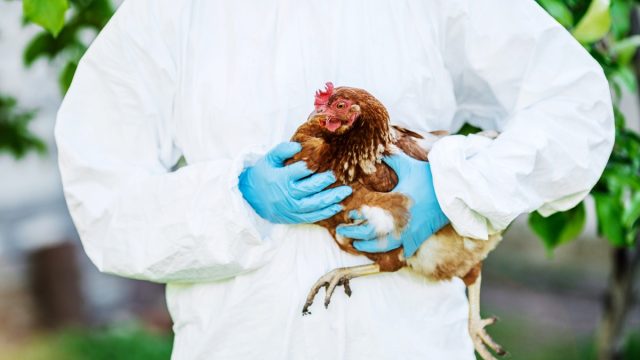Texas Reports First Human Case of Bird Flu—How You Can Stay Safe

Recent outbreaks have dominated the news cycle—and now, we have another illness to add to our list of concerns: bird flu.
In an April 1 press release, the Texas Department of State Health Services (DSHS) reported a human case of avian influenza A(H5N1) virus in Texas. Per the release, the person had “direct exposure to dairy cattle presumed to be infected with avian influenza.”
The Centers for Disease Control and Prevention (CDC), which performed the testing to confirm the bird flu diagnosis, added that the patient’s sole symptom was eye redness, consistent with conjunctivitis. The patient was instructed to isolate and is now being treated with an antiviral drug called oseltamivir, health officials said.
The human case in Texas marks the second case of H5N1 in the U.S., with the first reported in Colorado in 2022. Still, the CDC and the Texas DSHS stress that the risk of infection for humans is low. At the same time, it’s worth noting that the World Health Organization (WHO) has expressed concerns about the increasing number of bird flu cases among mammals, which “raises concern that the virus might adapt to infect humans more easily.”
The CDC is monitoring workers who may have been in contact with infected birds or animals, while also testing anyone who develops symptoms. These can include eye infections, upper respiratory symptoms, and—in severe cases—pneumonia and death.
Transmission of bird flu between people is also rare, but there are a few precautions you can take to stay safe. Read on for health officials’ recommendations.
RELATED: Deadly Bacterial Meningitis Is Spreading in the U.S., CDC Says—These Are the Symptoms.
Don’t eat or prepare undercooked food.

The CDC recommends that people avoid preparing or eating uncooked or undercooked food. This includes unpasteurized (raw) milk or cheeses made from raw milk. Even though the infected person was in contact with a dairy cattle, health officials say this doesn’t affect the commercial milk supply.
“Milk and milk products provide numerous health benefits. However, raw unpasteurized milk can make people sick,” the Texas DSHS warns in a health alert. “Pasteurization is the process of heating milk to a high enough temperature for enough time to kill harmful germs in the milk, including all kinds of flu viruses. Milk sold in stores is required to be pasteurized and is safe to drink.”
RELATED: Norovirus Cases Spiking Across U.S.—These Are the Symptoms.
Practice good hygiene.

The Texas DSHS notes that basic hygienic practices are also a good idea to keep yourself safe.
“People can protect themselves against flu by washing their hands often, covering their coughs and sneezes, not picking up dead birds and animals, and staying home if sick,” the health alert states.
Avoid “unprotected exposures.”

Taking preventive measures and avoiding “unprotected exposures” to certain animals is imperative, the CDC says. This includes sick or dead animals (wild birds, poultry, and other domesticated birds); wild or domesticated animals (including cattle); and animal carcasses.
This is particularly important for people with “prolonged, unprotected exposures” to infected birds or animals or contaminated environments, as these individuals have a greater risk of infection, according to the CDC.
RELATED: Leprosy Cases Are Rising in the U.S.—These Are the Symptoms to Know.
Be aware of symptoms and contact your doctor if necessary.

People exposed to birds or animals that could be infected with bird flu should be monitored for signs and symptoms over a 10-day days.
According to the Texas DSHS, if you expect you have the flu in general, contact your healthcare provider to discuss treatment options.
“Routine antiviral treatment, such as Tamiflu (oral oseltamivir), is known to be effective against flu,” the agency says.
Best Life offers the most up-to-date information from top experts, new research, and health agencies, but our content is not meant to be a substitute for professional guidance. When it comes to the medication you’re taking or any other health questions you have, always consult your healthcare provider directly.
- Source: Texas Health and Human Services: DSHS Reports First Human Case of Avian Influenza in Texas
- Source: CDC: Highly Pathogenic Avian Influenza A (H5N1) Virus Infection Reported in a Person in the U.S.
- Source: CDC: U.S. Case of Human Avian Influenza A(H5) Virus Reported
- Source: WHO: Ongoing avian influenza outbreaks in animals pose risk to humans
- Source: Texas Health and Human Services: Health Alert: First Case of Novel Influenza A (H5N1) in Texas, March 2024